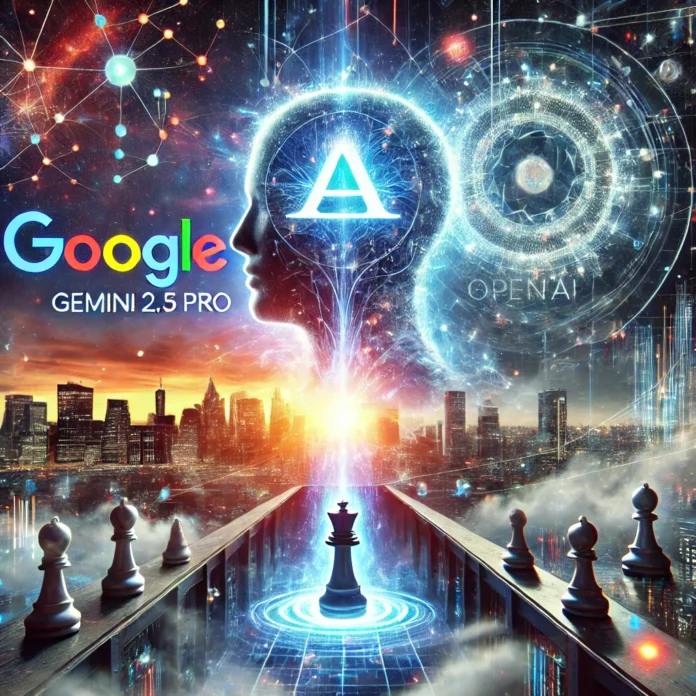In the past 48 hours, the AI landscape has been rocked by seismic developments that signal a new chapter in the race for artificial intelligence supremacy. Google’s unveiling of the Gemini 2.5 Pro and OpenAI’s bold strategic maneuvers, including a $3 billion acquisition and a reaffirmed commitment to its nonprofit roots, have sent ripples through the tech world. These advancements underscore the relentless pace of innovation and competition in AI, with implications for businesses, developers, and global economies.
Google’s Gemini 2.5 Pro: A Leap in Multimodal Reasoning
On May 7, 2025, Google announced the Gemini 2.5 Pro, a multimodal “reasoning” model that has already climbed AI benchmark leaderboards. According to Google, this experimental model outperforms competitors in key metrics, excelling in processing and generating text, images, and audio. Its native integration with the Google ecosystem enhances its utility for developers building applications in healthcare, education, and cybersecurity. Posts on X hailed the model’s capabilities, with @TheRundownAI noting its leaderboard dominance and @0xRajat calling it a “game-changer” for conversational AI.
The Gemini 2.5 Pro’s standout feature is its ability to handle complex, multi-step problems with improved reasoning, a critical step toward more autonomous AI systems. Google’s investment in AI-powered grid optimization and collaborations with PJM Interconnection further highlight its ambition to apply AI to real-world challenges like energy infrastructure. However, some analysts caution that its deep Google ecosystem integration may limit its appeal for users tied to other platforms.
OpenAI’s Strategic Pivot: Nonprofit Control and Windsurf Acquisition
Meanwhile, OpenAI made headlines with two major moves. First, it reversed its earlier flirtation with a for-profit structure, announcing on May 6, 2025, that it will remain a nonprofit-controlled entity. This decision, reported by Reuters, aims to preserve its mission of advancing AI for humanity’s benefit while navigating mounting competitive pressures. The move was widely discussed on X, with @minchoi calling it a “crazy week” for AI news.
Second, OpenAI acquired Windsurf, a coding tool startup, for $3 billion. This acquisition, noted by @0xRajat, bolsters OpenAI’s developer ecosystem, positioning it to compete with rivals like Cursor, which recently hit a $9 billion valuation. Windsurf’s integration into OpenAI’s suite could enhance its offerings for developers building AI-driven applications, particularly in coding and automation. These moves come as OpenAI faces intense competition from Google, Anthropic, and xAI, with its valuation reportedly soaring to $300 billion in a recent funding round.
Broader Implications: Competition, Ethics, and Economic Impact
The rapid advancements in AI models like Gemini 2.5 Pro and OpenAI’s strategic plays highlight the fierce competition driving the industry. Companies are racing to deliver more powerful, efficient, and versatile AI systems, with multimodal models becoming a focal point. These models, capable of processing diverse inputs like text, images, and audio, are poised to transform industries from entertainment (e.g., Netflix’s new conversational AI search) to finance (e.g., xAI’s partnership with Palantir).
However, this breakneck pace raises ethical and regulatory questions. Anthropic’s CEO, Dario Amodei, recently emphasized the need for interpretability in AI models by 2027, warning that opaque systems could pose risks to national security and economic stability. Meanwhile, Microsoft and other AI leaders are urging U.S. lawmakers to streamline permitting for AI energy needs, signaling the massive infrastructure demands of next-generation models. Posts on X, such as @ReutersTech’s coverage, reflect growing calls for balanced AI regulation that fosters innovation while addressing ethical concerns.
Economically, the AI sector continues to attract staggering investments. OpenAI’s $40 billion funding round and Cursor’s $9 billion valuation underscore the confidence in AI’s transformative potential. Yet, as Morningstar notes, AI stocks have faced volatility, with tariffs and market uncertainties impacting valuations. The global AI market is projected to grow exponentially, but the high costs of training models and building infrastructure remain a hurdle for smaller players.
What’s Next for AI?
The developments of the past two days signal a pivotal moment for AI. Google’s Gemini 2.5 Pro sets a new benchmark for multimodal performance, while OpenAI’s strategic moves solidify its position as a leader in the AI race. As competition intensifies, the focus on ethical AI, regulatory frameworks, and sustainable infrastructure will shape the industry’s trajectory.
For businesses and developers, these advancements offer exciting opportunities. Tools like Gemini 2.5 Pro and Windsurf could streamline workflows and unlock new applications. However, navigating the ethical and economic complexities of AI will require careful consideration.




